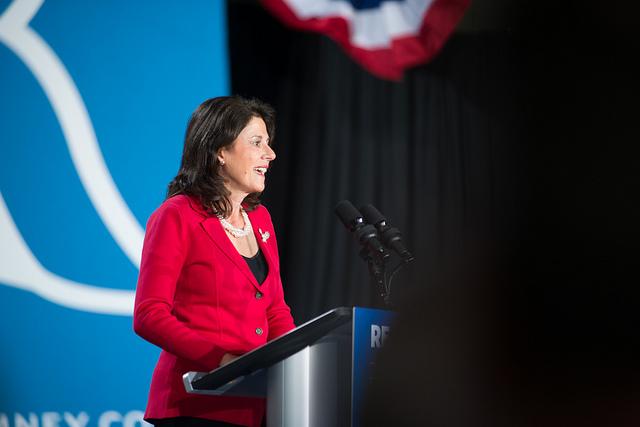Monday at the University of Wisconsin-Milwaukee, incumbent Senator Tammy Baldwin, D-Wisconsin, and her opponent, State Senator Leah Vukmir, R-Milwaukee, took the stage for their first debate.
They spent the evening engaging in a back-and-forth regarding several issues including healthcare, the Tomah Veterans Association, abortion, the #MeToo movement and immigration, where Vukmir expressed her strong support for the construction of a wall at the Mexican-American border.
When asked by WTMJ anchor and moderator Shannon Sims whether she would support a pathway to citizenship for DREAMers if it included funding for a border wall, Vukmir — remaining consistent with her past statements — stated that she would not support such a policy until our borders are secure which is to say, “not until that wall is built.” In her words: “… That wall is also important from the perspective of human trafficking, drug trafficking, MS-13 gang members.”
Executive order to end DACA leaves UW ‘dreamers’ living in limbo
Border walls are simply not effective. In Nogales, Arizona, where a border wall already exists, people seeking to cross the border are still able to do so, with one reporter saying “A climber with a rope can hop it in less than half a minute, [smugglers] with jackhammers tunnel under it [and] throw rocks and drugs over it.”
Although border walls do tend to make crossing the border harder, people still really want to cross it, and — unable to do so themselves — may have to rely on the help of a cartel-affiliated smuggler. By enlisting the help of these individuals, the likelihood of becoming a victim of human trafficking increases a whole bunch. Further bolstering border security would simply create more demand for smugglers, who use their positions of power to smuggle into the U.S. people and drugs.
In addition to its ineffectiveness, constructing a wall spanning the length of the southern border of the U.S. would be extremely expensive. Just how expensive is hard to say, but estimates have ranged from “Mexico will pay for it” to $21.6 billion to $70 billion.
Spending an unknown, but certainly very large, quantity on a project with unproven benefits seems antithetical to Vukmir’s “staunch conservatism,” but she’s certainly not alone within her party, whose leader asked Congress for $25 billion for the project.
Trump’s use of “chain migration” epithet dehumanizes family reunification
Next, Vukmir touts her experience as a nurse, saying that the influx of undocumented immigrants into the United States poses a significant public health problem and alluding to immigrants at Ellis Island being quarantined before being turned away from entering the United States. As a matter of fact, the undocumented immigrant community could be on the verge of a public health crisis, but it’s not the kind of thing that additional screening would solve.
Doctors have reported that, fearing Immigration and Customs Enforcement’s ramping up of deportations (including in hospitals), many undocumented immigrants have been missing their medical appointments. This phenomenon has been credited as a factor during a brief mumps outbreak in Massachusetts last year.
And finally, Vukmir’s background as the daughter of immigrants is worth addressing. During the debate, she recalled helping her aunt and uncle study for their naturalization tests when she was growing up, stressing their legal immigration as a relevant anecdote to her point that going around granting citizenship to everyone who enters this country would be “[unfair] to all of those who have come before.” Fair enough, but there are several factors that made immigration much easier for Vukmir’s aunt and uncle to become citizens than it is for undocumented immigrants entering the U.S. today.
By including undocumented students, PEOPLE program takes step forward for educational accessibility
For starters, her relatives had family already in the country, making obtaining a green card much easier. Getting a green card in modern times with or without family members already living in the country is a process that can take years and entail sky high legal costs that most simply cannot afford.
After receiving the green card, naturalization candidates must live in the U.S. for five years, then file more paperwork, pass some tests and hope to still be alive by that point. Vukmir’s family came to America in a time before our immigration courts had a backlog of roughly three quarters of a million cases.
If Leah Vukmir is interested in what is “fair” regarding the United States’ immigration policy, she has sure struggled to articulate it.
Sammy Fogel ([email protected]) is a freshman majoring in political science and Spanish.





















